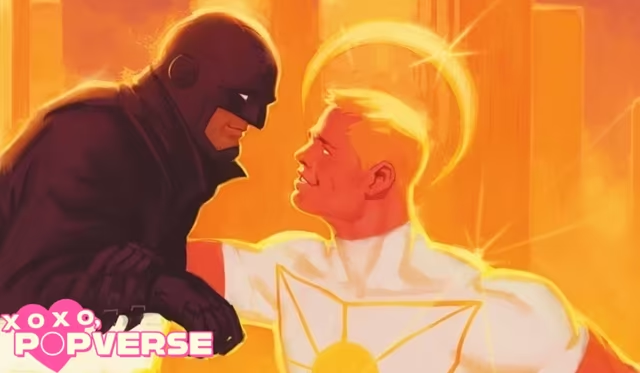If you click on a link and make a purchase we may receive a small commission. Read our editorial policy.
Who created Wolverine? After 50 years, Marvel has changed the answer (for them, at least)
Roy Thomas is now officially a co-creator of the fan-favorite character, according to reports

Popverse's top stories
- Every Star Wars trilogy is really a bad romantasy story and you'll never convince me otherwise
- Midnighter and Apollo from DC Comics proved that fighting a tyrant together is incredibly romantic
- Members only: Ask Ming-Na Wen, Critical Role, Gail Simone, Karl Urban, Chris Claremont, Denys Cowan, and more your questions as part of ECCC x Popverse member exclusive!
The strangest thing about the news last week that Marvel has recently officially declared the company's then top editor, Roy Thomas, a co-creator of fan-favorite X-Men character Wolverine is that it’s not based on any new information — but, instead, a new distinction on Marvel’s behalf about what constitutes the actual creation of any given comic book character.
Last week, it emerged from a former Marvel employee that Marvel had told Christine Valada, the widow of Wolverine co-creator comic book writer Len Wein, that the company would be officially crediting Thomas as Wolverine’s co-creator in the upcoming Deadpool & Wolverine movie, alongside Wein and artist John Romita Sr.; while Marvel has yet to comment on the change, Thomas himself seemingly confirmed it in a recent interview on the topic.
The subject is a thorny one, and an emotional one — especially in regards to the fact that Thomas is the only surviving member of the group named as those collaborating on Wolverine’s creation, and his inclusion into that group in an official sense has been seen by some as taking credit away from the both Wein and Romita Sr., who are both deceased now and can't speak on their behalf. So… who did create Wolverine? Well… it’s complicated.
The Wolverine name

At the root of Thomas’s inclusion, it appears, is the idea that in 1974, Thomas, acting as Marvel’s de-facto editor-in-chief (although that actual title wouldn’t be used by the company until some years later), gave freelance writer Len Wein the name ‘the Wolverine,’ and the direction to come up with a Canadian character who was small and angry, based on the belief that Marvel had a significant audience in Canada who would appreciate some representation. It’s a story that Thomas notably detailed at length in 2019, two years after Wein’s death, but versions of it appear as far back as 1982’s fanzine The X-Men Companion. (We’ll come back to that soon enough.) The details have appeared a little malleable depending on the telling — in some versions, Thomas was considering the character for a planned international team of X-Men, in others, a character who would debut in The Incredible Hulk before being used elsewhere with no specific plan in place — but the overall gist has remained the same for more than 40 years by this point.
That last part is important, in terms of defending Thomas from speculation that he started to make these claims after Wein had passed; Thomas has been talking about his involvement in Wolverine’s creation for more than four decades by this point. More to the point, Wein himself had also shared this version of events. In 1986, Marvel published The Incredible Hulk vs. Wolverine, a one-off special issue reprinting the first two appearances of Wolverine in 1974's The Incredible Hulk #180 and 181, accompanied by a text essay detailing the character’s origins. In that essay, Wein explains Thomas’s involvement by saying, “Roy said, ‘Wolverine is a great name. It’s a nasty little beast. Give me a character who goes with the name.’”
So, everyone seems to agree: Thomas came up with the character’s nationality and name, right? Right? Well… not so fast.
Who actually came up with the name Wolverine?
The 1986 feature in The Incredible Hulk vs. Wolverine quoted above doesn’t just include Wein giving Thomas credit for the name; it also complicates matters by suggesting a possibility that Thomas didn’t actually come up with the name himself. That feature mentions that, prior to Thomas giving direction to Wein, artist Dave Cockrum had presented concept art to Thomas for potential future X-Men characters that featured, in Cockrum’s words, “a vulpine type, animalistic, bestial, feral, who I called Wolverine.” Thomas “admits he may simply have forgotten about it,” the piece adds.
That’s a more measured response than the one Thomas had given four years earlier, in the aforementioned X-Men Companion interview where he initially laid claim to be part of Wolverine’s creation. In that interview, comics historian Peter Sanderson also raised the Cockrum presentation, only for Thomas to respond, “It doesn’t take much brains for either of us to come up with a name like Wolverine anyway. Animal characters are a big thing. Dave may have done that. On the other hand, it’s like when I invented the Banshee. I got an angry letter from a kid who said he’d once sent in a letter to me, Stan, or somebody else suggesting a character called the Banshee. And of course I thought it was just ridiculous [laughter] because names like ‘Wolverine’ and ‘Banshee’ are just names. A name like Captain Marvel is a made-up name, maybe, but all the others — Superman, Batman — they’re all just grabbed from somewhere.”
As chance would have it, there’s another somewhere that Thomas may have grabbed the name from before giving it to Wein. In 1973, a year prior to Wolverine’s creation, Marvel’s official in-house fanzine FOOM published entries for a fan contest to create a new Marvel hero. One specific entry, as published in FOOM #2, stands out: a character with a metal skeleton, created by Andy Olsen, called ‘The Wolverine.’ One of the three editors of that issue of FOOM was none other than Roy Thomas.

What counts as creation?
What actually constitutes creation of a character is, of course, part of this conversation. Going back to 1986’s The Incredible Hulk vs. Wolverine, the essay describes what Wein did with Thomas’s suggestion. “Wein did not know at this time that he himself would end up co-creating the ‘new’ X-Men, but was aware than an international team of X-Men was being planned. He decided to make Wolverine a mutant so that he could be used as a member of this new X-Men team later on,” the feature reads, noting that Wein was also the person who came up with the character having adamantium claws, although he intended them to be part of the character’s gloves, not part of his skeleton. In other words, Wein didn’t simply write the first comic book appearances of Wolverine, he put in place many of the elements that made Wolverine who the character actually is.
In an interview where Thomas addresses the current reaction to his addition to the official team of creators of the character, the writer and former editor says, “I could have assigned it to a different writer using my four parameters and John [Romita’s] design. Wolverine would have been something different because it wasn’t Len writing it, but I still would have been co-creator.”
(Those four parameters Thomas mentions are the name, that he be Canadian, that he should be short “because superheroes are usually tall,” and that he should be fierce because wolverines are instinctively fierce, if you’re curious.)
Thomas’s feelings appear, on the surface, to be somewhat dismissive of what made Wolverine work as a character — Wein’s contributions, as well as Chris Claremont’s, Dave Cockrum’s, and John Byrne’s, predominantly — in favor of the idea that what’s actually important is a name, a nationality, and an attitude. (And, of course, the visual.) But… where does that leave the creation of legacy characters like DC’s many Flashes or Green Lanterns? Or Marvel’s multiple Ghost Riders or Spider-Men, for that matter?
(Of course, this is assuming that Thomas didn’t actually get the name from somewhere else. If he did, is nationality, height, and general attitude enough to rate a co-creator credit?)
But what about the artists?

A very brief aside in this whole topic about assigning creator credit: there is no dispute surrounding who was behind the visual creation of Wolverine: John Romita Sr, who designed the character in his role as Marvel's then-art director. Herb Trimpe illustrated the character's first two comic book appearances as the regular artist on the Incredible Hulk series, but he famously didn't consider himself a co-creator of the character.
The known unknowns
Perhaps the most important part of this story doesn’t have anything to do with Wolverine, or even Roy Thomas, at all. Instead, it’s the question of what actually counts as being part of a character’s creation — not to the character, or the fans, or even the creators themselves, perhaps, but to the companies responsible for creating the official record of such things.
After all, if Thomas can be named as a co-creator on Wolverine for suggesting a name and nationality, does that mean Stan Lee is a co-creator on the Punisher for naming that character? What about any other editor who has given a name to a creator and asked for a pitch? Is Joey Cavalieri the co-creator of Spider-Man 2099 under this same logic? Spider-Man: Across the Spider-Verse doesn’t specifically list creators of any characters, but Cavalieri, who edited Spider-Man 2099 at launch, doesn’t even rate a “Special thanks.”
Thomas is on record as believing that he was added to the list of co-creators because Marvel Studios had more interest in correcting the record than 20th Century Fox, who previously controlled Wolverine’s big screen appearances. (Notably, the Fox X-Men movies didn’t actually credit creators with anything more than “special thanks.”)
He also says, notably, “this is not a financial issue. I’m not getting a penny, as far as I know, and it in no way takes away from whatever Len [Wein] and John [Romita]’s families may be getting, if anything. I don’t know what their financial arrangement is with Marvel. I’m already getting money from my other contributions to Marvel; I don’t need Wolverine money, thank you very much.” He returns to this idea later in the same interview, saying, ““I’m not trying to take anything away from anyone, I just want credit for what I did. If there’s Wolverine money [from Disney], I hope his widow gets rich off it. I’ve got my own. I don’t need Len’s or hers.”
Without comment from Marvel, it’s the unknowns that might end up having the greatest impact moving forward. Why was Thomas added to the official list of Wolverine's creators now? Was adding a Marvel editor to the list of creators a one-off occurrence, or will it happen increasingly in the future? Does that have a financial impact on deals creators have in place for royalties surrounding media adaptations — and, if money is shared between creators and some creators were involved as Marvel staff, does that mean a percentage of royalties would be paid to the individuals in question, or pushed back towards Marvel as a company? (Surely not, if Romita receives financial rewards for his own involvement; after all, he was also staff at the time. And yet... Thomas claims he's seeing no money from his own involvement.)
It’ll be interesting to see if Marvel does comment on this topic at any point in the near future — as well as what the end credits of Deadpool & Wolverine will actually say when the movie is released this summer. Given his seeming laissez-faire attitude towards the importance of character names in the creative process in general, you have to wonder what 1982’s Roy Thomas would make of the current situation, don’t you?
Consider this a meta post-credits scene for Marvel fans - the four key articles you need to read next to continue the thrills:
Follow Popverse for upcoming event coverage and news
Find out how we conduct our review by reading our review policy
Let Popverse be your tour guide through the wilderness of pop culture
Sign in and let us help you find your new favorite thing.
















Comments
Want to join the discussion? Please activate your account first.
Visit Reedpop ID if you need to resend the confirmation email.